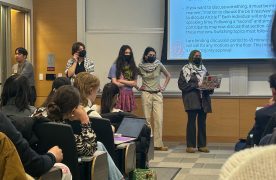This weekend, I’ll be lucky enough to see a performance of “The Vagina Monologues” right here at Boston University. I’m crazy excited to see this show, and not just because I have a few friends who are in the production.
“The Vagina Monologues,” according to playwright Eve Ensler’s website, is a “whirlwind tour of a forbidden zone” and “introduces a wildly divergent gathering of female voices.” Like its title suggests, the performance is basically a collection of monologues given by women representing different characters, including a “six-year-old girl, a septuagenarian New Yorker … and a feminist happy to have found a man who ‘liked to look at it.’”
Consequently, I’m so excited to see this show because I think it fills a void in mainstream media by forcing us to realize that we are weirdly afraid of talking about vaginas and other similar body parts. Even writing that last sentence, I had to pause and contemplate whether I wanted to use the word “vagina” or write an ambiguous euphemism like “genitalia,” “private parts” or something similar.
This fear was especially made clear in 2012, when the Michigan House of Representatives banned Rep. Lisa Brown from speaking after using the word “vagina” while debating an abortion bill, NPR reported. In response to her comments, Rep. Mike Callton said, “What she said was offensive. It was so offensive, I don’t even want to say it in front of women. I would not say that in mixed company.”
What does it say about us as a society when our own elected officials are afraid to talk about certain body parts, especially when the argument at hand pertained to placing restrictions on those body parts?
The mystery surrounding genitalia, especially female genitalia, has turned very important body parts into mythological taboos, and not just for people who do not have those parts. Even people with vaginas may not have a full understanding of what different parts of their bodies do, or even where they are.
Take a woman’s menstrual cycle, for example. If you think about it, it is incredibly strange how a process that is so normal for billions of people on this planet is such a mystery. When someone does try to talk about their menstrual cycle, they’re often met with adverse reactions about how “TMI” the topic is.
Young girls grow up learning that they can only talk about their periods in hushed tones with their female friends or their mothers. They go into their high school or middle school nurse’s office for an emergency tampon or pad and do everything they can to avoid saying the word “period” out loud so they do not have to deal with their male classmates’ snickers.
The physical pain that can arise when someone is on their period from cramps, backaches, fatigue or nausea can sometimes be so strong that they cannot leave their bed for days. But when they attempt to complain about it, they receive no sympathy and are told they have no clue what “real pain” is. And do not even get me started on how when a girl gets angry, a typical response is, “What, are you on your period or something?” These belittling comments basically tell girls that their feelings and emotions are not valid because of their body parts.
Our approach to these issues clearly needs to change. Performances and other pieces of art like “The Vagina Monologues” are breaking down those walls and forcing us to be more comfortable and open with each other. The fact that college-aged students are performing “The Vagina Monologues” further emphasizes that these issues affect people at every age, from any generation.
In order to start changing society’s norms as a whole, we have to start with ourselves. I know I am going to start being more open with my friends of all genders and using a body’s part actual name — say it with me now, “vagina” — instead of a nickname that will simply cause more shame.
It may not seem like that big of a deal, but the sooner we start changing the way we think, the better the experience we can create for the next generation of girls who do not deserve to be shamed for having a period, and for the next generation of boys who may have questions about anatomy that they’re too afraid to ask. It is time to erase these taboos once and for all, and plays like “The Vagina Monologues” are making the job a little easier.











